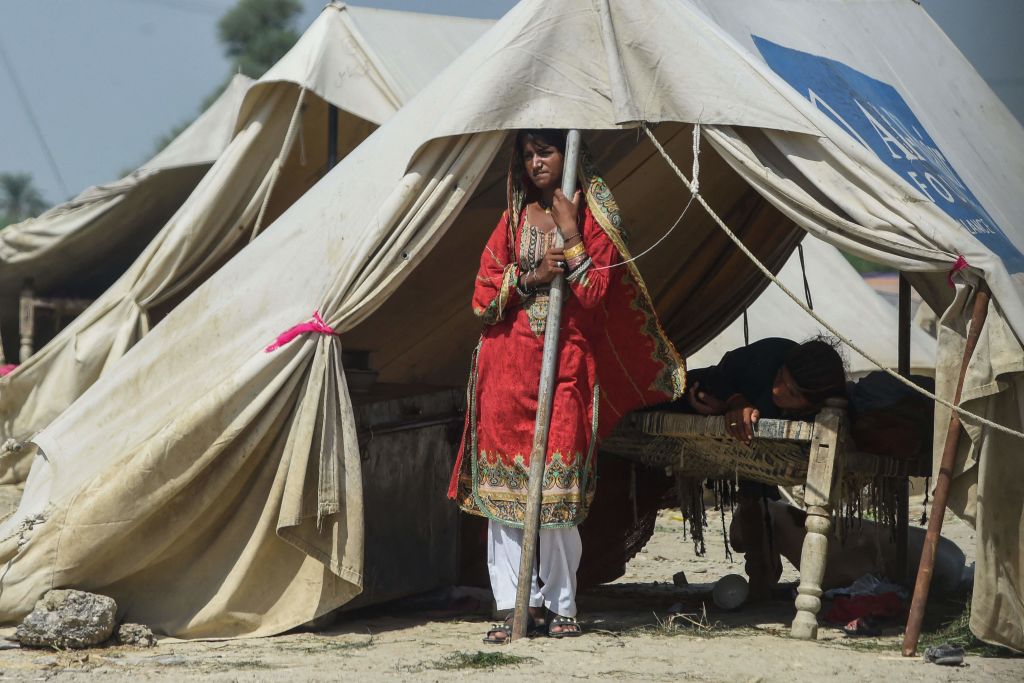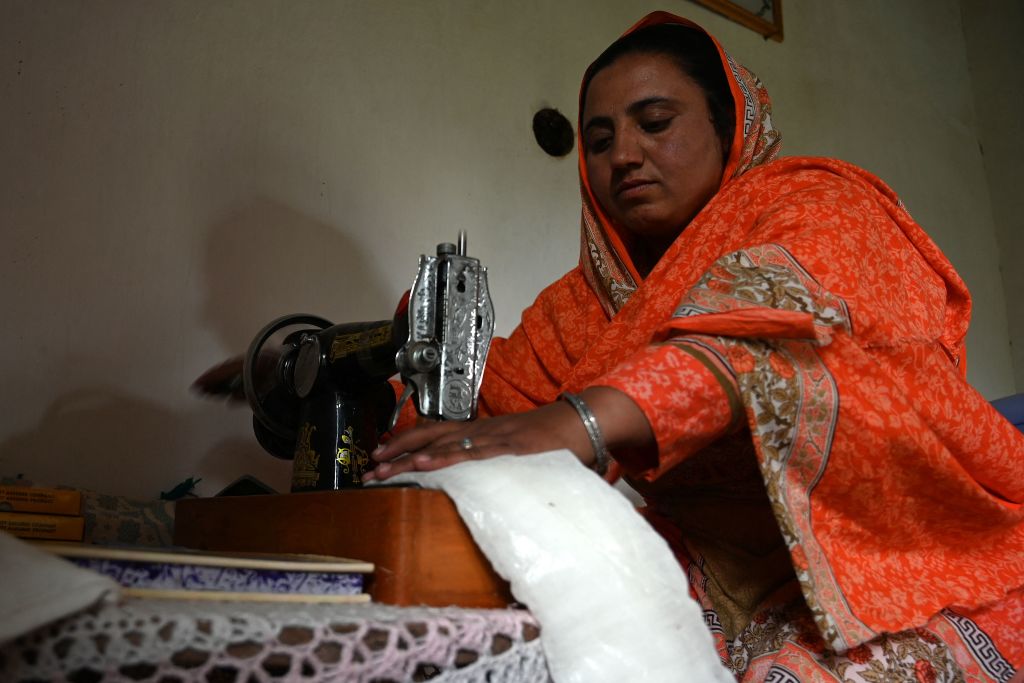Many of the more than 8 million women of reproductive age affected by Pakistan’s unprecedented floods have been turning to desperate measures to manage their periods. One woman in the hard-hit province of Balochistan, who called volunteers in distress, reported using tree leaves.
“It was heartbreaking,” says Bushra Mahnoor, one of two college students who in July founded Mahwari Justice, a grassroots movement to distribute menstrual products to women in need.
Floods have inundated one-third of Pakistan and displaced more than 33 million people. The waters have also killed more than 1,400 individuals and destroyed hundreds of thousands of houses, as well as bridges and roads. More than 660,000 people are still living in relief camps and makeshift homes.
On Monday, Prime Minister Shahbaz Sharif said the country was grappling with food shortages. Relief organizations are rushing aid to affected areas—but supplies of menstrual products are often overlooked. That’s partly because of the stigma around discussing periods in Pakistan, according to Mahnoor.
Read More: Scotland Just Showed How Easy It Is to End Period Poverty
“When people associate shame with menstruation, people also do not talk about the problems associated with menstruation,” she tells TIME.
That’s why Mahwari Justice chose such an unapologetic name for itself: Mahwari simply means “periods” in Urdu, Pakistan’s national language. As the flood waters intensified, the group redoubled its efforts to get menstrual products to Pakistani women, knowing that the deluge could lead to a higher incidence of reproductive and urinary tract infections by making safe menstrual practices even harder.
So far, Mahwari Justice has delivered 20,000 menstrual kits to those in need and Mahnoor and her co-founder Anum Khalid have been invited to speak about their efforts on the BBC. Along with similar organizations, they have also helped generate a general discussion about the most effective way to help women in flood-stricken areas.
“This is something that gets neglected really easily because for a lot of people, and especially for countries like Pakistan—where laws are made by men, when relief work is led by men—there’s no discussion around what a woman needs,” says Sana Lokhandwala, co-founder of HER Pakistan. The group has so far handed out more than 7,000 menstrual kits and partners with volunteers, community mobilizers, activists, and other organizations to distribute additional essentials such as food, shelter, and clothing.

The needs of Pakistan’s rural women
Even before the floods, misconceptions about periods were rife in Pakistan.
Dr. Sidra Nausheen, an assistant professor and vice chair of research in obstetrics and gynecology at the Aga Khan University Hospital in Pakistan’s biggest city Karachi, has been working for many years in rural communities to raise awareness about proper menstrual management. She has encountered girls and women who would not take a bath for a week, or avoid drinking hot or cold beverages, for fear it would disrupt their cycle. Some women would be confined to a room until their periods were over. Many girls were not attending school during their periods because of the lack of availability of menstrual products.
“Menstrual hygiene is something that in Pakistan especially nobody talks about,” Nausheen tells TIME. In such an atmosphere, inaccurate information can thrive. “Lots of women don’t know what’s happening to their bodies.”
When Mahnoor and Khalid first started Mahwari justice, they studied other disaster relief efforts to learn about the most effective ways of supplying menstrual products. They also spoke directly with women in rural areas to find out what items would be most helpful.
Read More: Why the Idea of Period Leave Is Still Sparking Debate
Then they came up with three kinds of kits. One contains a pack of sanitary napkins and underwear, the second small towels and underwear, while the third consists of cotton pads. Diagrams accompany the kits, showing the right way to use the products.
Different circumstances determine which items are most effective. Lokhandwala, of HER Pakistan, explains that if flood waters haven’t receded, cloth towels may present problems as there is no clean water to wash and dry them.
“Cloth pads might work in one community if they are still living in homes and have washing supplies, but might not work in relief camps,” she says.

Menstrual help for women in Pakistan
Doctors, relief workers, and public health advocates have long called for Pakistan to remove its luxury tax on menstrual products. “Women don’t feel luxurious during these days,” Khalid says.
“Menstrual kits [and] sanitary napkins should be free but the taxes on them are so high people cannot afford it,” says Dr. Alia Haider, a doctor currently working in relief camps. “It’s the responsibility of the state to give us a healthy life—health should be free.”
But until menstrual products become affordable, many Pakistani women will have no choice but to rely on private organizations and volunteers for help in managing periods.
Read More: The Tampon Shortage Is the Supply Chain Problem No One Is Talking About
From 2019 to 2021, Nausheen and her colleagues from Aga Khan University Hospital conducted fieldwork on menstrual hygiene among women aged 14-49 in Dadu district, Sindh province—an area hit hard by the recent floods. About 40% of the 25,000 women surveyed in Dadu were not using any pads or napkins during their periods but instead would repeatedly change out of and wash their stained clothes.
“Many weren’t aware of reusable pads or the availability of pads. They thought it was very expensive and ‘We can’t afford it,’” Nausheen says.
Nausheen and her team taught the women how to stitch pads from a cheap, absorbent cloth available in the local market. Now, some 90% of the women who took part in the survey are using such pads. Many are also making and selling them—even during the catastrophic floods.
Says Khalid of Mahwari Justice: “Periods never stop during any calamity.”
More Must-Reads from TIME
- Caitlin Clark Is TIME's 2024 Athlete of the Year
- Where Trump 2.0 Will Differ From 1.0
- Is Intermittent Fasting Good or Bad for You?
- The 100 Must-Read Books of 2024
- Column: If Optimism Feels Ridiculous Now, Try Hope
- The Future of Climate Action Is Trade Policy
- FX’s Say Nothing Is the Must-Watch Political Thriller of 2024
- Merle Bombardieri Is Helping People Make the Baby Decision
Write to Sanya Mansoor at sanya.mansoor@time.com